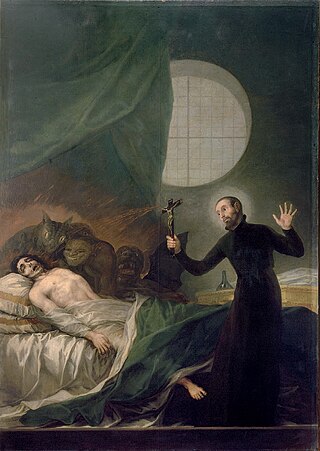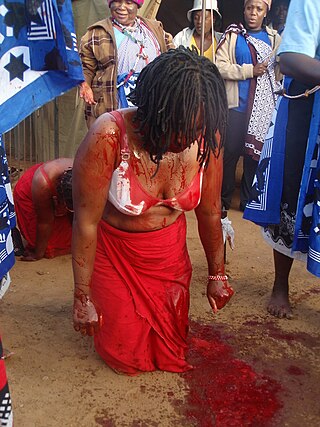Related Research Articles
A mental disorder, also referred to as a mental illness or psychiatric disorder, is a behavioral or mental pattern that causes significant distress or impairment of personal functioning. A mental disorder is also characterized by a clinically significant disturbance in an individual's cognition, emotional regulation, or behavior. It is usually associated with distress or impairment in important areas of functioning. There are many different types of mental disorders. Mental disorders may also be referred to as mental health conditions. Such features may be persistent, relapsing and remitting, or occur as single episodes. Many disorders have been described, with signs and symptoms that vary widely between specific disorders. Such disorders may be diagnosed by a mental health professional, usually a clinical psychologist or psychiatrist.
Psychosis is a condition of the mind that results in difficulties determining what is real and what is not real. Symptoms may include delusions and hallucinations, among other features. Additional symptoms are incoherent speech and behavior that is inappropriate for a given situation. There may also be sleep problems, social withdrawal, lack of motivation, and difficulties carrying out daily activities. Psychosis can have serious adverse outcomes.
Dissociative identity disorder (DID), formerly known as multiple personality disorder, split personality disorder or dissociative personality disorder, is a member of the family of dissociative disorders classified by the DSM-5, DSM-5-TR, ICD-10, ICD-11, and Merck Manual for diagnosis. It remains a controversial diagnosis, despite rigorous study in the scientific literature since 1975.

Spirit possession is an unusual or an altered state of consciousness and associated behaviors which are purportedly caused by the control of a human body by spirits, ghosts, demons, or gods. The concept of spirit possession exists in many cultures and religions, including Buddhism, Christianity, Haitian Vodou, Dominican Vodou, Hinduism, Islam, Wicca, and Southeast Asian, African, and Native American traditions. Depending on the cultural context in which it is found, possession may be considered voluntary or involuntary and may be considered to have beneficial or detrimental effects on the host.
A delusion is a false fixed belief that is not amenable to change in light of conflicting evidence. As a pathology, it is distinct from a belief based on false or incomplete information, confabulation, dogma, illusion, hallucination, or some other misleading effects of perception, as individuals with those beliefs are able to change or readjust their beliefs upon reviewing the evidence. However:

Traditional healers of Southern Africa are practitioners of traditional African medicine in Southern Africa. They fulfill different social and political roles in the community like divination, healing physical, emotional, and spiritual illnesses directing birth or death rituals, finding lost cattle, protecting warriors, counteracting witchcraft and narrating the history, cosmology, and concepts of their tradition.

Abnormal psychology is the branch of psychology that studies unusual patterns of behavior, emotion, and thought, which could possibly be understood as a mental disorder. Although many behaviors could be considered as abnormal, this branch of psychology typically deals with behavior in a clinical context. There is a long history of attempts to understand and control behavior deemed to be aberrant or deviant, and there is often cultural variation in the approach taken. The field of abnormal psychology identifies multiple causes for different conditions, employing diverse theories from the general field of psychology and elsewhere, and much still hinges on what exactly is meant by "abnormal". There has traditionally been a divide between psychological and biological explanations, reflecting a philosophical dualism in regard to the mind-body problem. There have also been different approaches in trying to classify mental disorders. Abnormal includes three different categories; they are subnormal, supernormal and paranormal.

Delusional disorder is a mental illness in which a person has delusions, but with no accompanying prominent hallucinations, thought disorder, mood disorder, or significant flattening of affect. Delusions are a specific symptom of psychosis. Delusions can be bizarre or non-bizarre in content; non-bizarre delusions are fixed false beliefs that involve situations that could occur in real life, such as being harmed or poisoned. Apart from their delusion or delusions, people with delusional disorder may continue to socialize and function in a normal manner and their behavior does not necessarily generally seem odd. However, the preoccupation with delusional ideas can be disruptive to their overall lives.
Clinical lycanthropy is a rare psychiatric syndrome that involves a delusion that the affected person can transform into, has transformed into, or is, an animal. Its name is associated with the mythical condition of lycanthropy, a supernatural affliction in which humans are said to physically shapeshift into wolves. It is purported to be a rare disorder.
In medicine and medical anthropology, a culture-bound syndrome, culture-specific syndrome, or folk illness is a combination of psychiatric and somatic symptoms that are considered to be a recognizable disease only within a specific society or culture. There are no objective biochemical or structural alterations of body organs or functions, and the disease is not recognized in other cultures. The term culture-bound syndrome was included in the fourth version of the Diagnostic and Statistical Manual of Mental Disorders which also includes a list of the most common culture-bound conditions. Counterpart within the framework of ICD-10 are the culture-specific disorders defined in Annex 2 of the Diagnostic criteria for research.
This glossary covers terms found in the psychiatric literature; the word origins are primarily Greek, but there are also Latin, French, German, and English terms. Many of these terms refer to expressions dating from the early days of psychiatry in Europe.

Exorcism is the religious or spiritual practice of evicting demons, jinns, or other malevolent spiritual entities from a person, or an area, that is believed to be possessed. Depending on the spiritual beliefs of the exorcist, this may be done by causing the entity to swear an oath, performing an elaborate ritual, or simply by commanding it to depart in the name of a higher power. The practice is ancient and part of the belief system of many cultures and religions.
The trauma model of mental disorders, or trauma model of psychopathology, emphasises the effects of physical, sexual and psychological trauma as key causal factors in the development of psychiatric disorders, including depression and anxiety as well as psychosis, whether the trauma is experienced in childhood or adulthood. It conceptualises people as having understandable reactions to traumatic events rather than suffering from mental illness.
The following outline is provided as an overview of and topical guide to abnormal psychology:
Grisi siknis is a contagious, culture-bound syndrome that occurs predominantly among the Miskito people of eastern Central America, and affects mainly young women. It is also known as "grisi munaia", "Chipil siknis", and "Nil siknis". More recently, cases occurring amongst people of Spanish descent have also been reported.
Mystical psychosis is a term coined by Arthur J. Deikman in the early 1970s to characterize first-person accounts of psychotic experiences that are strikingly similar to reports of mystical experiences. According to Deikman, and authors from a number of disciplines, psychotic experience need not be considered pathological, especially if consideration is given to the values and beliefs of the individual concerned. Deikman thought the mystical experience was brought about through a "deautomatization" or undoing of habitual psychological structures that organize, limit, select, and interpret perceptual stimuli. There may be several causes of deautomatization—exposure to severe stress, substance abuse or withdrawal, and mood disorders.
Zouhuorumo, also known as qigong deviation, is a Chinese-culture concept traditionally used to indicate that something has gone wrong in spiritual or martial arts training. The qigong community uses this term to describe a physiological or psychological disorder believed to result during or after qigong practice, due to "improper practice" of qigong and other self-cultivation techniques. The concept was highlighted in the social and political context of mass popularization of qigong in China. The Buddhist or Taoist community also uses this term when referring to people who practice esoteric techniques or meditation without the proper guidance of a teacher.
Emotional flooding is a form of psychotherapy that involves attacking the unconscious and/or subconscious mind to release repressed feelings and fears. Many of the techniques used in modern emotional flooding practice have roots in history, some tracing as far back as early tribal societies. For more information on emotional flooding, see Flooding (psychology).
A religious delusion is defined as a delusion, or fixed belief not amenable to change in light of conflicting evidence, involving religious themes or subject matter. Religious faith, meanwhile, is defined as a belief in God or a religious doctrine in the absence of evidence. Psychologists, scientists, and philosophers have debated the distinction between the two, which is subjective and cultural.

Ukuthwasa is a Southern African culture-bound syndrome associated with the calling and the initiation process to become a sangoma, a type of traditional healer. In the cultural context of traditional healers in Southern Africa, the journey of ukuthwasa involves a deeply spiritual process marked by rituals, teachings, and preparations. It begins with a calling, idlozi, from ancestors, often received through dreams or altered states of consciousness. Ukuthwasa process entails physical, psychological, and spiritual manifestations, which are believed to cleanse and prepare the initiate. The term ukuthwasa meaning "come out" or "be reborn," signifies the transformative nature of the experience. Both men and women can become traditional healers through this calling.
References
- 1 2 Niehaus DJ, Oosthuizen P, Lochner C, Emsley RA, Jordaan E, Mbanga NI, Keyter N, Laurent C, Deleuze JF, Stein DJ (March–April 2004). "A culture-bound syndrome 'amafufunyana' and a culture-specific event 'ukuthwasa': differentiated by a family history of schizophrenia and other psychiatric disorders". Psychopathology . Karger Publishers. 37 (2): 59–63. doi:10.1159/000077579. PMID 15057028. S2CID 23545601.
- 1 2 3 4 Helman, Cecil G. (January 26, 2007). "Cross-Cultural Psychiatry". Culture, Health and Illness, Fifth edition. CRC Press. p. 269. ISBN 9781444113631. Archived from the original on November 30, 2016. Retrieved August 23, 2016.
- 1 2 3 "Psychopathology". Fresh Perspectives: Introduction to Psychology. Pearson South Africa. 2007. p. 368. ISBN 9781868912896.
- ↑ Lund C, Swartz L (June 1998). "Xhosa-Speaking Schizophrenic Patients' Experience of Their Condition: Psychosis and Amafufunyana". South African Journal of Psychology . Psychological Society of South Africa. 28 (2): 62–70. doi:10.1177/008124639802800202. S2CID 147441136.
- ↑ Sinason, Valerie (2002). "Dissociation and Spirit Possession". Attachment, Trauma and Multiplicity: Working with Dissociative Identity Disorder. Psychology Press. pp. 233–236. ISBN 9780415195560.